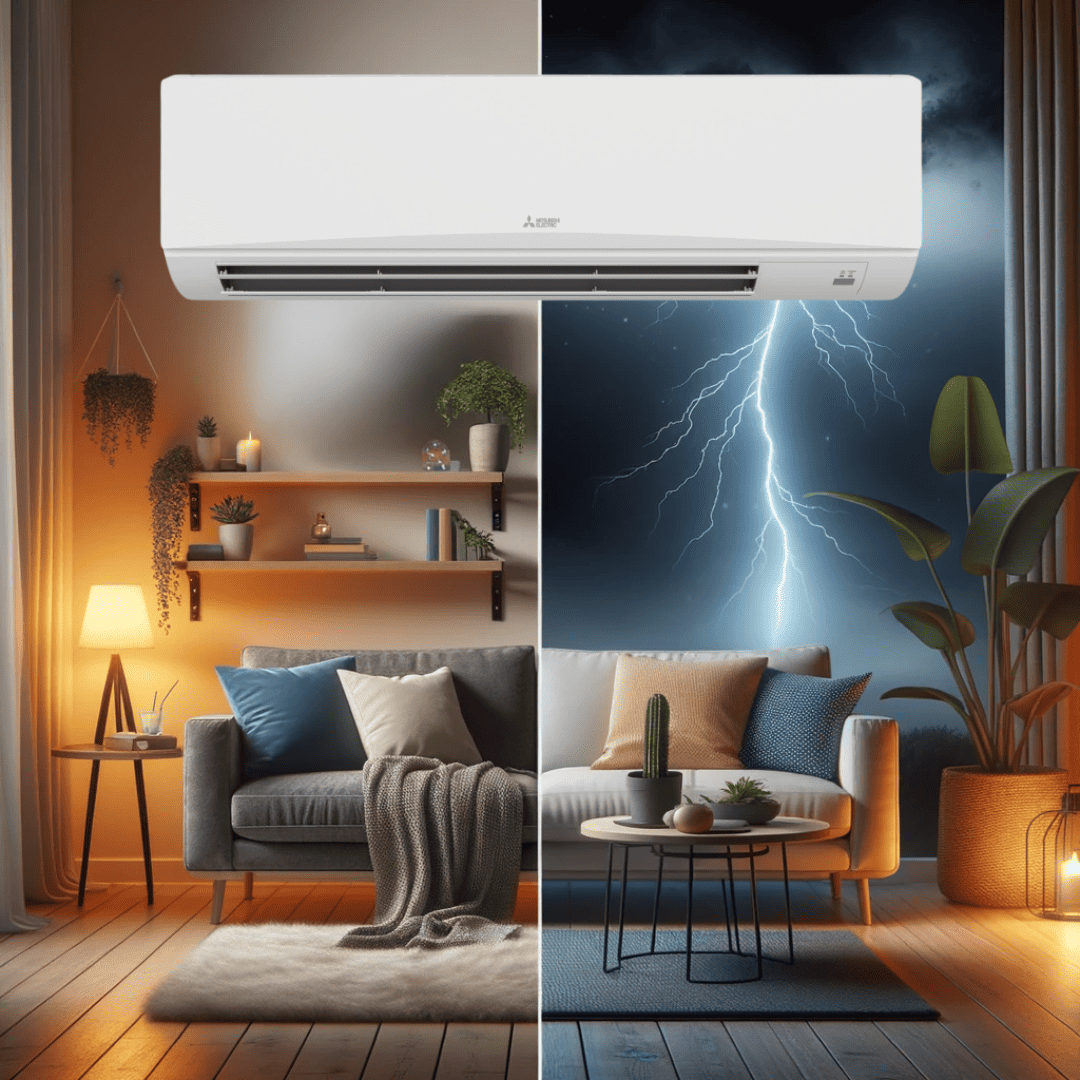Silent or Stormy? The Surprising Truth About Mini Split Noise Levels
Mini split air conditioning systems have revolutionized the way we cool and heat our homes. But how do they fare when it comes to indoor noise levels? As we strive for comfort, the noise our HVAC systems produce can play a significant role in our overall satisfaction. This article dives deep into the world of mini splits, exploring their noise levels and how they compare to other systems.
Table of Contents:

Are mini splits loud inside?
In the context of quiet operation and minimizing indoor noise levels, it's essential to understand decibel ratings (dB), which serve as the standard unit for measuring sound levels.
Understanding Mini Split Systems
At its core, a mini split system is a type of ductless air conditioning and heating solution that offers several advantages over traditional HVAC systems, primarily due to its ductless nature. Here's a deeper look at mini splits and why they are favored for their quiet operation and energy efficiency.
Ductless Design: Unlike traditional HVAC systems that rely on extensive ductwork to distribute air throughout the home, mini splits are ductless. This means they operate by targeting specific areas or rooms directly. This design not only reduces energy loss associated with ducts but also provides homeowners with unparalleled flexibility in cooling or heating individual spaces.
How Mitsubishi Electric Mini Splits Work
Mitsubishi Electric mini splits consist of an outdoor compressor unit connected to one or more indoor air handling units via refrigerant lines. The compressor pumps refrigerant to the indoor units, which then cool or heat the air and distribute it directly into the room. This ductless design eliminates the need for extensive ductwork and allows for targeted temperature control in individual spaces.
Comparing Mini Split Noise Levels to Other HVAC Systems
When it comes to noise levels, mini splits have a clear advantage over traditional HVAC systems. While conventional systems can generate noise levels between 50 and 75 decibels (dB), mini splits typically operate at a much quieter 25 to 35 dB indoors. To put this in perspective, a noise level of 25 dB is comparable to a whisper or a quiet library, while 75 dB is similar to the sound of a vacuum cleaner.
Factors Affecting Mini Split Noise Levels
Several factors can influence the noise levels of a mini split system:
- Compressor noise: The compressor, often considered the heart of the mini split system, has seen significant advancements in technology, leading to quieter operation and reduced noise levels.
- Fan noise: The noise generated by fans, which play a crucial role in air circulation within the system, can vary depending on factors like fan speed and design.
- Installation quality: A poorly installed mini split system can result in unnecessary noise due to issues such as loose components or improper placement. Ensuring a high-quality installation is essential for maintaining a quiet indoor environment.
- System size: Selecting the appropriate size mini split for your space is crucial. An oversized system may cycle on and off more frequently, leading to increased noise levels.
- Indoor unit placement: Proper placement of the indoor unit can help minimize noise. Avoid installing the unit near walls or in corners, as this can amplify sound.
Decibel Ratings and Quiet Operation:
In the context of quiet operation and minimizing indoor noise levels, it's essential to understand decibel ratings (dB), which serve as the standard unit for measuring sound levels. When selecting a mini split system, it becomes crucial to check its decibel rating to ensure it aligns with your comfort requirements. Many modern mini split models, particularly those from reputable brands like Mitsubishi Electric, prioritize silent operation and boast decibel ratings well within the quiet range.
Quietest Mitsubishi Electric Mini Split Models
Mitsubishi Electric offers several mini split models known for their quiet operation:
- Single-Zone: Mitsubishi MUZ-FH Series
- Available in capacities ranging from 9,000 to 24,000 BTU/h
- Operates at noise levels as low as 20 dB
- Multi-Zone: Mitsubishi MXZ Series
- Can connect up to 8 indoor units to a single outdoor unit
- Offers noise levels as low as 22 dB
Real-World Examples of Mini Split Noise Levels
To better understand mini split noise levels, consider these real-world examples:
- A mini split operating at 25 dB is comparable to the sound of a whisper or a quiet library.
- At 35 dB, a mini split is similar to the ambient noise level in a quiet suburban area at night.
- In comparison, a traditional HVAC system operating at 60 dB is like the sound of a normal conversation or an air conditioner running at medium speed.
Addressing Common Concerns About Mini Split Noise
1. Can I install a mini split in my bedroom without disrupting my sleep? Yes, with the right system and proper installation, a mini split can be quiet enough to use in a bedroom without causing sleep disturbances. Look for models with low decibel ratings, like the Mitsubishi MUZ-FH Series, and consider using a lower fan speed setting at night.
2. Will a mini split be too noisy in a small apartment? Mini splits are well-suited for small apartments due to their ductless design and quiet operation. By selecting a system with an appropriate capacity for your space, such as the Mitsubishi MXZ Series, and ensuring proper installation, you can minimize noise levels and maintain a peaceful living environment.
Additional Benefits of Mitsubishi Electric Mini Splits
In addition to their quiet operation, Mitsubishi Electric mini splits offer several other benefits:
1. Affordability: Mini splits are cost-effective to install and operate, especially when compared to traditional HVAC systems.
2. Environmentally Friendly: Mitsubishi Electric mini splits use R-410A refrigerant, which has zero ozone depletion potential and contributes to reduced greenhouse gas emissions.
3. Improved Air Quality: Many Mitsubishi Electric mini split models feature advanced filtration systems that remove allergens, dust, and other pollutants from the air, promoting a healthier indoor environment.

FAQ on Mini Split Noise Levels
1. What is a mini split system? A mini split system is a highly efficient ductless air conditioning and heating solution that eliminates the need for extensive ductwork. It excels at targeting specific areas or rooms, providing both energy efficiency and the flexibility to control individual spaces' climate.
2. How loud is a mini split system? Mini split systems typically operate at noise levels ranging from 25 to 35 decibels (dB) indoors. This noise level is notably quiet, similar to a soft conversation, making them an excellent choice for maintaining a peaceful indoor environment.
3. How does the noise level of a mini split compare to traditional HVAC systems? Mini splits operate at significantly lower noise levels compared to traditional HVAC systems. While conventional systems can generate noise levels between 50 and 75 dB, mini splits typically run at a much quieter 25 to 35 dB indoors.
4. Can the noise level of a mini split be reduced? Yes, the noise level of a mini split system can be effectively reduced through a combination of measures, including professional installation, regular maintenance, and the use of noise-reducing accessories such as vibration dampeners and sound-absorbing materials.
5. What factors contribute to the noise level of a mini split system? The noise level of a mini split system can be influenced by several factors, including compressor noise, fan noise, installation quality, system size, and indoor unit placement.
Conclusion
Mitsubishi Electric mini split systems have revolutionized the way we cool and heat our homes, offering unmatched efficiency, flexibility, and remarkably low noise levels. By understanding the factors that influence mini split noise levels and selecting the quietest models, like those from Mitsubishi Electric's MUZ-FH and MXZ Series, homeowners can enjoy a peaceful indoor environment without sacrificing comfort. As the demand for energy-efficient and noise-reducing HVAC solutions continues to grow, Mitsubishi Electric mini splits remain a top choice for those seeking the perfect balance between performance and tranquility.



